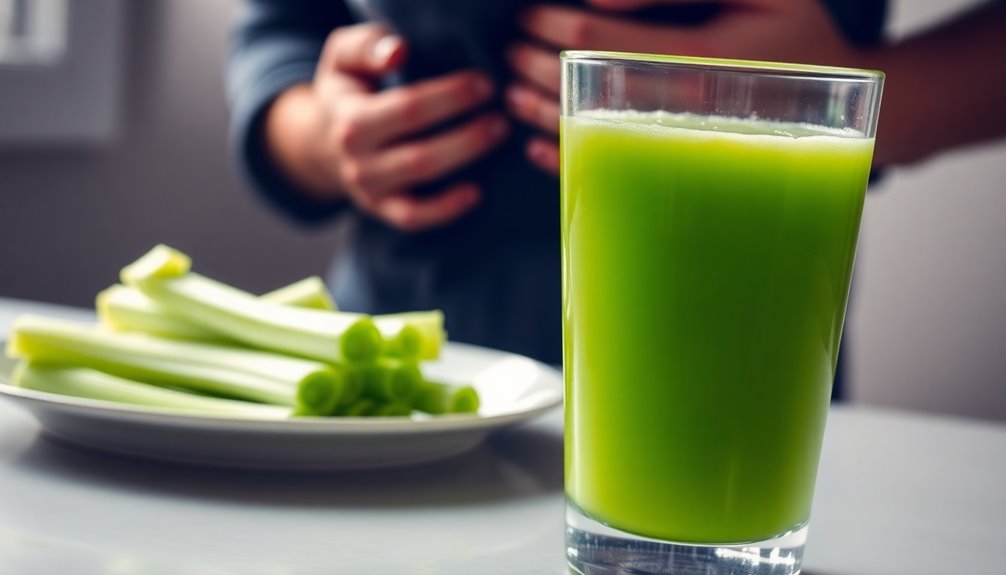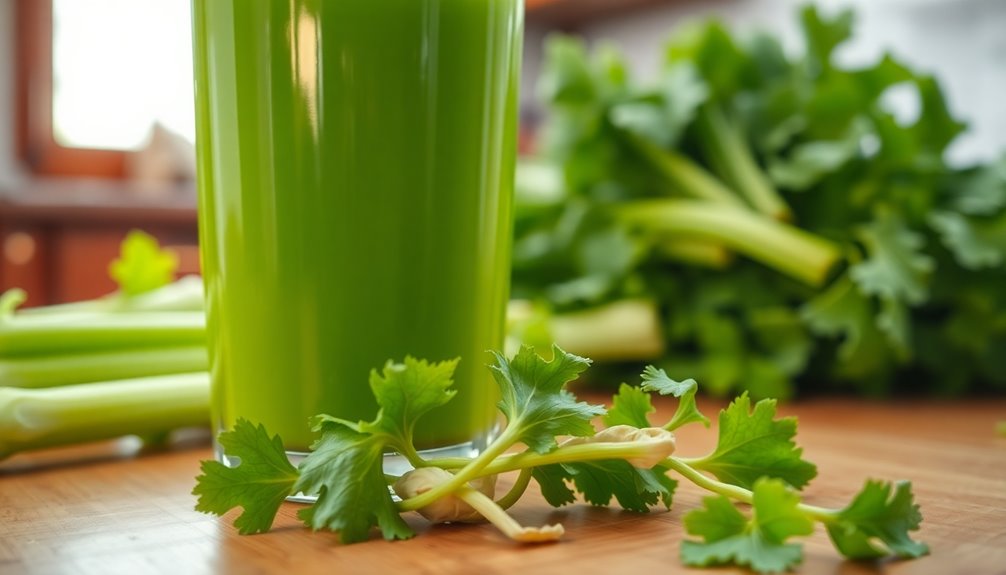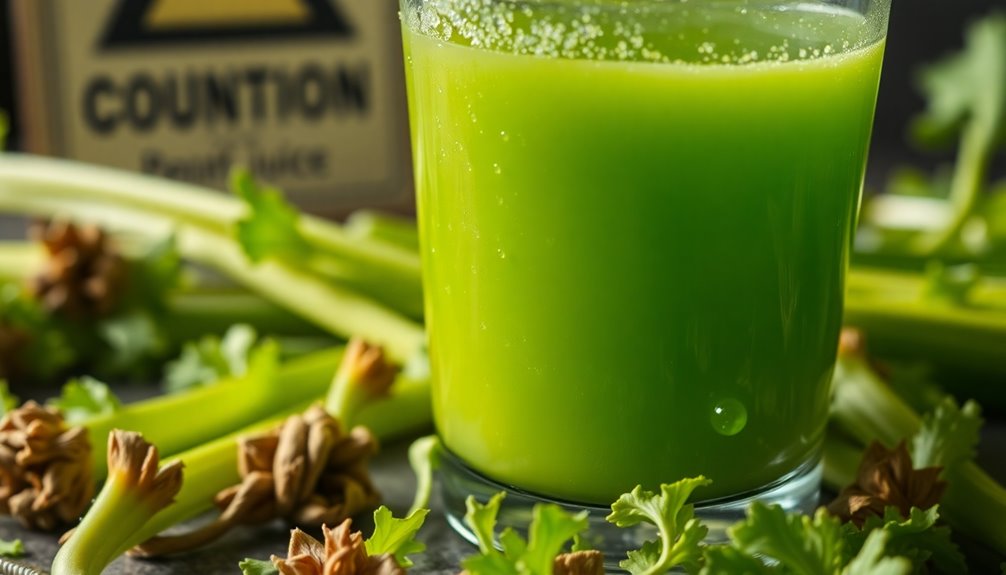Celery juice might sound healthy, but it can cause several negative side effects. You could experience allergic reactions, especially if you have food allergies. Digestive issues like bloating and diarrhea are common, and it may increase your skin's sensitivity to sunlight. If you have kidney problems, the oxalates in celery can be a concern. Plus, it's low in fiber, which may leave you feeling hungry soon after. Discover more essential information about celery juice next!
Key Takeaways
- Celery juice can cause allergic reactions, especially in individuals with sensitivities to related plants like carrots and parsley.
- It may lead to digestive discomfort, including bloating, gas, and even diarrhea due to starch fermentation.
- Regular consumption can increase skin sensitivity to sunlight, raising the risk of sunburns or rashes.
- Celery juice contains oxalates, which can contribute to kidney stone formation and pose risks for those with kidney issues.
- Low fiber content in celery juice may lead to increased hunger and calorie intake, making it less satisfying as a meal replacement.
Allergic Reactions

Have you ever considered how celery might affect your health? While many tout the benefits of celery juice, it's essential to be aware of potential allergic reactions.
Some individuals can experience symptoms ranging from mild itching to severe anaphylaxis after consuming celery. If you have food allergies, particularly to related plants like carrots or parsley, you might be at a higher risk.
Curiously, boiling celery doesn't eliminate allergens, meaning cooked forms can still trigger reactions. The Scientific Committee for Food even highlighted these risks in a study.
Digestive Issues

While many people enjoy the invigorating taste of celery juice, it can sometimes lead to digestive issues for some individuals. The starch in celery may ferment in your gut, causing discomfort.
A study in Clinical and Experimental Gastroenterology shows this can be especially true for those with sensitivities. If you have existing digestive conditions, celery juice might intensify your symptoms.
Here are a few things to keep in mind:
- Bloating and gas can occur.
- Some may experience diarrhea.
- The lack of fiber can lead to blood sugar spikes.
- Gradually introducing celery juice is advisable.
- Always monitor your individual tolerance.
Additionally, it's important to be aware that a diet high in whole, unprocessed foods may help mitigate some of these digestive issues.
Being cautious can help you enjoy celery juice without the unpleasant side effects.
Skin Sensitivity

If you enjoy celery juice, be aware that it can increase your skin's sensitivity to sunlight.
Celery contains psoralens, compounds that may heighten your risk of sunburns or rashes, especially if you have pre-existing sensitivities.
Research published in the International Journal of Dermatology indicates that consuming celery juice can exacerbate skin reactions, leading to itching, swelling, or redness even with moderate intake.
If you plan to enjoy your celery juice before spending time outdoors, it's essential to take precautions.
Applying sunscreen and wearing protective clothing can help shield your skin from harmful UV rays.
If you notice adverse reactions, consider reducing or eliminating celery juice from your diet to protect your skin health.
Stay safe and enjoy responsibly!
Kidney Problems

Consuming celery juice can pose serious risks for your kidney health, especially if you have a history of kidney problems.
Celery contains oxalates, which can contribute to the formation of kidney stones and worsen existing conditions. Regular intake might elevate oxalate levels in your body, leading to potential renal failure.
Consider the following:
- Oxalates can crystallize, forming kidney stones.
- Individuals with compromised kidney function should be cautious.
- A study links high oxalate intake to kidney health issues.
- Staying hydrated may help reduce oxalate risks.
- Monitor your celery juice intake if you're susceptible to kidney problems.
Taking these factors into account can help you make informed decisions about celery juice consumption and protect your kidney health.
Low in Fiber

Although many people enjoy the invigorating taste of celery juice, it's important to recognize that it's low in fiber, which can lead to issues with hunger and digestion.
The juicing process removes most of the fiber, leaving you with a drink that might make you feel hungry again soon after. This low-fiber content can contribute to rapid fluctuations in blood sugar levels, leaving you craving more food throughout the day.
A study published in Nutrition and Metabolism highlights how low-fiber diets increase overall calorie intake, as you may not feel satisfied.
To combat these drawbacks of the celery juice movement, consider pairing your juice with fiber-rich foods for more balanced nutrition and better appetite control. Additionally, the high water content in celery juice can aid in hydration support, but it should not replace whole fruits and vegetables in your diet for optimal health.
Frequently Asked Questions
Can Celery Juice Have Negative Effects?
Yes, celery juice can have negative effects. You might experience digestive issues like bloating or gas due to its starches.
If you're sensitive, it could increase your skin's sensitivity to sunlight, leading to rashes. Additionally, celery contains oxalates that may contribute to kidney stones if you have pre-existing conditions.
Without fiber, it can cause blood sugar spikes and increased hunger. If you're allergic, take caution, as reactions can range from rashes to severe anaphylaxis.
When Should You Not Drink Celery Juice?
You shouldn't drink celery juice if you have a celery allergy or intolerance, as it can trigger severe reactions.
If you're on blood thinners, be cautious since it contains vitamin K, which might interfere with your medication.
Additionally, if you have kidney problems, limit your intake due to oxalates.
Finally, if you experience digestive issues like bloating or gas, monitor how your body reacts before making it a regular part of your diet.
What Are the Downsides of Celery?
While celery's often praised for its health benefits, it does have downsides you should consider.
You might experience digestive issues, like bloating or gas, especially if you're sensitive. If you have kidney problems, the oxalates in celery could be risky.
Plus, celery can make your skin more sensitive to sunlight. If you have allergies, even cooked celery can trigger reactions.
Why Do I Feel Weird After Drinking Celery Juice?
If you feel weird after drinking celery juice, it could be due to its low fiber content, causing blood sugar spikes and dips.
You might also experience bloating or gas if you're sensitive to the starches in celery.
Additionally, celery contains psoralens that can increase skin sensitivity to sunlight.
If you have a celery allergy or high oxalate levels, you could face further discomfort.
It's crucial to listen to your body's reactions.
Conclusion
To sum up, while celery juice can be a invigorating addition to your diet, it’s important to be aware of its potential downsides. Just like a double-edged sword, it can bring both benefits and risks. Keep an eye out for allergic reactions, digestive issues, and skin sensitivity. If you have kidney problems or a low-fiber diet, you might want to think twice before sipping. Always listen to your body and consult a healthcare professional if you’re unsure! Moreover, it’s essential to pay attention to when to drink celery juice, as timing can impact how your body responds to it. Consuming it on an empty stomach may enhance its detoxifying effects, but for some, it could lead to discomfort. Ultimately, finding the right balance that works for you is key to reaping the benefits without adverse effects. To further maximize the positive aspects of celery juice, it’s crucial to experiment with your own routine and pay attention to how your body reacts. Incorporating it into your mornings or alongside meals may yield different results, so be sure to adjust accordingly. Remember, understanding when to drink celery juice can significantly enhance your experience, allowing you to enjoy its refreshing taste while maintaining your overall well-being.
Cindy thoroughly researches juicing trends, techniques, and recipes to provide readers with practical advice and inspiration. Her writing style is accessible, engaging, and designed to make complex concepts easy to understand. Cindy’s dedication to promoting the advantages of juicing shines through her work, empowering readers to make positive changes in their lives through the simple act of juicing.











